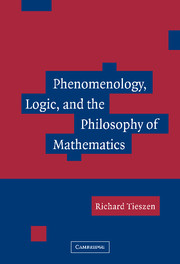Book contents
- Frontmatter
- Contents
- Acknowledgments
- Introduction: Themes and Issues
- PART I REASON, SCIENCE, AND MATHEMATICS
- 1 Science as a Triumph of the Human Spirit and Science in Crisis: Husserl and the Fortunes of Reason
- 2 Mathematics and Transcendental Phenomenology
- 3 Free Variation and the Intuition of Geometric Essences: Some Reflections on Phenomenology and Modern Geometry
- PART II KURT GÖDEL, PHENOMENOLOGY, AND THE PHILOSOPHY OF MATHEMATICS
- PART III CONSTRUCTIVISM, FULFILLABLE INTENTIONS, AND ORIGINS
- Bibliography
- Index
1 - Science as a Triumph of the Human Spirit and Science in Crisis: Husserl and the Fortunes of Reason
Published online by Cambridge University Press: 14 July 2009
- Frontmatter
- Contents
- Acknowledgments
- Introduction: Themes and Issues
- PART I REASON, SCIENCE, AND MATHEMATICS
- 1 Science as a Triumph of the Human Spirit and Science in Crisis: Husserl and the Fortunes of Reason
- 2 Mathematics and Transcendental Phenomenology
- 3 Free Variation and the Intuition of Geometric Essences: Some Reflections on Phenomenology and Modern Geometry
- PART II KURT GÖDEL, PHENOMENOLOGY, AND THE PHILOSOPHY OF MATHEMATICS
- PART III CONSTRUCTIVISM, FULFILLABLE INTENTIONS, AND ORIGINS
- Bibliography
- Index
Summary
The reason for the failure of rational culture, as we said, lies not in the essence of rationalism itself but solely in its being rendered superficial, in its entanglement in ‘naturalism’ and ‘objectivism’.
(Husserl, “The Vienna Lecture”, 1935)Husserl's later philosophy contains an extensive critique of the modern sciences. This critique of what Husserl calls the ‘positive’, ‘naive’, or ‘objective’ sciences has been very influential in Continental philosophy and, in particular, in the retreat from holding up science and technology as models for philosophy. Philosophers such as Heidegger, Merleau-Ponty, Ricoeur, Habermas, and Derrida, along with many others on the Continent, have been influenced by this part of Husserl's thought. There is also in Husserl's work, however, a very grand view of the value and possibilities of science, provided that science is understood appropriately and in a broad sense as a theory of the many forms of reason and evidence. It cannot be adequately understood as a narrow, technical, naturalistic, and ‘one-sided’ specialization of one sort or another. Indeed, in its broadest sense, science would coincide with the rigorous exercise of philosophical reason. In Husserl's writings we find (1) reflections on the nature of science as a whole; (2) studies of particular sciences, especially geometry, arithmetic, logic, and natural science; but also (3) a far-reaching analysis of how modern scientific culture has fallen away from its higher calling. I will discuss each of these aspects of Husserl's philosophical thinking. (For some earlier studies of these topics see, e.g. Gurwitsch 1974; Heelan 1989; Ströker 1988, 1987a, 1979.)
- Type
- Chapter
- Information
- Phenomenology, Logic, and the Philosophy of Mathematics , pp. 21 - 45Publisher: Cambridge University PressPrint publication year: 2005
- 2
- Cited by



